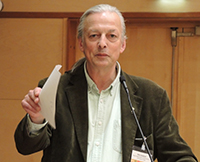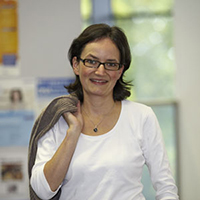Friday 29 September 2017, University of Oslo
Programme
Poster

Connecting, engaging and nurturing EMBLs global community of current and former scientists, technicians, communicators and administrators
Programme
Poster

Raising awareness of EMBL in Norway
While some Norwegian life science researchers may be aware of EMBL, many are unaware of the scope of training, education and work opportunities that the organisation offers across six sites in Europe. To help raise awareness of these opportunities for Norwegians, the “EMBL in Norway” event was organised by two EMBL alumni who are now professors at the University of Oslo’s Department of Biosciences Rein Aasland, Head of Department, and Gareth Griffiths member of department and Chair of the Alumni Association together with EMBL’s Alumni Relations team.
The programme featured talks that introduced the opportunities and facilities available at EMBL from past and current researchers, as well as the importance of EMBL to Norwegian science policy. A detailed overview of EMBL, and what it can offer Norway, was given by EMBL Director, Matthias Hentze with special focus on EMBL’s Core Facilities, as requested by the organisers: “EMBL Core Facilities are one of the key aspects of why young people at EMBL have a very high chance of being successful. It has trained personnel with no user fees, empowering individual groups to make the most of technologies.” Matthias highlighted to the participants.
An overview of the Nordic EMBL Partnership for Molecular Medicine and how NCMM and other associated centres benefit from the links to EMBL was given by the Director of the Centre for Molecular Medicine Norway (NCMM), Professor Kjetil Taskèn.
Fond memories from alumni speakers included Tor Erik Rusten, former EMBL predoc and current Group Leader at Oslo University Hospital, who announced: “At EMBL you make friends forever, you make a network for life. You learn from the best and therefore you will become one of the best.”
EMBL’s Council delegate Jakob Wang sung the highest praises: “It’s not just EMBL research that’s excellent, but also administration. If I were a young researcher today, there’s no other place I would rather go than EMBL. Norway is very proud to be a member of this organisation.”
This was followed by the message from Gareth Griffiths that “EMBL, EMBO and HFSP are funded by many European countries including Norway – urging Norwegians to make better use of these resources.“

Now: Head, Department of Biosciences, University of Oslo
EMBL: Postdoc, Genome Biology, Stewart Group, EMBL Heidelberg, 1992-1995
What did you work on during your postdoc?
I worked in the group of Francis Stewart, in the Gene Expression Programme. We studied how chromatin changes in Hox gene clusters during cell differentiation, a topic which introduced me to the ideas of the mechanisms for epigenetic gene regulation.
What do you feel you gained from your time at EMBL?
So much! Just being there, and the exposure to such a rich and dynamic learning environment was incredibly valuable for me. The connections I made and the opportunities offered to me were vast. For example, during my time, gene expression shared a coffee room with computational biology, meaning we often got talking to one another. Through these connections, I had the opportunity to learn lots of methods and ideas in applied bioinformatics, which allowed me to develop a bioinformatics-focussed side-project that ended up being very successful. Some of the findings from this work formed the basis of my later research.
How did it feel to go back to Norway?
Of course, moving away from EMBL was a huge change. Adapting to a new setting and taking on new responsibilities was a challenge. Yet I felt ready, and was able to put all of the knowledge and training I had acquired to good use. There have been quite a few people trained at EMBL, who have brought their knowledge and expertise back to Norway, and the wider Nordics. These people have definitely helped to positively influence the path of molecular biology here. I think anyone who has been there takes a piece of the EMBL home with them – both in terms of scientific expertise and in terms of the culture.
What does your work involve today?
Today I manage a large department at the University of Oslo which keeps me very busy. However, I am actually continuing the chromatin and gene regulation work I started at EMBL, although the focus has shifted towards the chromatin of enhancers and long-distance gene regulation, still with epigenetics in mind.
What was the mission of the EMBL in Norway event?
Gareth and I wanted to try and promote EMBL on a larger, more coordinated scale. We felt that by organising a dedicated information day that targeted PhD students and postdocs, with speakers made up of current students and various alumni, we could really show what it’s like to study or train at EMBL.

Now: Director of Fellowships, HFSP (Human Frontier Science Programme)
EMBO: Editor, EMBO Reports, 2007-2016
What is your involvement with EMBL?
The EMBO (European Molecular Biology Organisation) is closely linked to EMBL – not least because it shares the same campus in Heidelberg. During my time as Editor at EMBO, I worked directly with the EMBL Conferences bringing together research communities from both inside and outside the EMBL for scientific conferences. With funding from EMBL and EMBO, we were able to organise conferences at the EMBL Advanced Training Centre. It was a great success, and a really productive way for the two organisations to work together.
What is your experience with Norwegian researchers, in terms of applications for Fellowships from HFSP?
We would like to increase the number of Norwegians applying for funding from the HFSP. There are few applications due to a lack of awareness amongst Norwegian researchers about what HFSP is, and the kind of funding we offer.
Can these information events help raise awareness?
Definitely! I think one of the most powerful and effective tools is having former and current fellows or grant holders talk about their experiences – as they did at Oslo. It’s great, of course, to hear from the top-ranking officials, but hearing from those that are closer to the experience of actually being there makes a huge difference to those that might consider applying.
Why do you think the number of Norwegian researchers travelling abroad is low?
From speaking to a few people at the event in Oslo, it seems that they feel that returning to the Norwegian research environment will be too difficult for them. It would be really helpful to know more about the challenges that those who have managed to return have faced, and perhaps have them present on this too. It would also be interesting to hear from them whether they found any of the cultural aspects a challenge; for example the way research is done in Germany may be very different to how it is done in Norway.
How do you think we could encourage Norwegian researchers to consider studying or working abroad?
I imagine that if there was more of an incentive for them to look overseas, many more would take that opportunity. In Germany, for example, you have to study or train abroad if you want to get a good job, the same is not true in Norway. I also understand that researchers are very well funded in Norway, so the funding offered by organisations like EMBL and HFSP is perhaps not competitive enough.
How can we help communicate the opportunities available with organisations like HFSP, EMBO and EMBL?
Smaller sessions targeted towards younger researchers would help. For example, I went to a scientific meeting in Germany that included a special session called ‘Funders Hour’, where I was invited to speak as a representative from a funding organisation. In this case, just HFSP was involved, but I think it would be a good idea to run similar events that involve more than one funding organisation. It doesn’t have to happen at a big conference – it could even take places at a lab retreat or at a smaller seminar.
I’m sure, over time, the awareness will build – events like the one in Oslo are a wonderful way of starting this profile-raising and outreach process.
By Annabel Darby
If you are interested in organising alumni events in your country, or would like to get involved in other ways, please contact the Alumni Relations team.

EMBL has 38 alumni in Norway of which 24 are Norwegian. 30 work in academia, 3 work in industry and 5 work in other sectors. Cities attracting most alumni are Oslo (20) and Bergen (11).